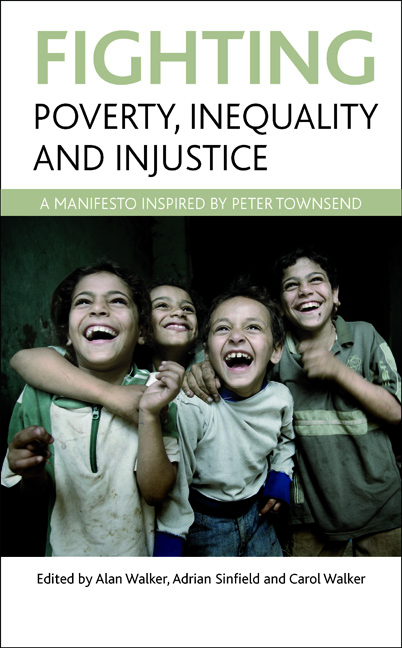Book contents
- Frontmatter
- Dedication
- Contents
- List of figures and tables
- Preface
- Notes on contributors
- one The legacy of Peter Townsend
- two The making of a pioneer researcher: reflections from Peter Townsend’s life story
- three Peter Townsend, a man ahead of his time: re-reading The family life of old people and The last refuge
- four The case for universal child benefit
- five Poverty
- six Social justice for children: investigating and eradicating child poverty
- seven For universalism and against the means test
- eight Underclass, overclass, ruling class, supernova class
- nine Addressing health inequalities: building on Peter Townsend’s legacy
- ten Towards a new sociology of ageing: from structured dependency to critical gerontology
- eleven Disability: prospects for social inclusion
- twelve Putting the lawyers in their place: the role of human rights in the struggle against poverty
- thirteen Radicalising social policy in the 21st century: a global approach
- fourteen Conclusion: building on the legacy of Peter Townsend
- Index
seven - For universalism and against the means test
Published online by Cambridge University Press: 01 September 2022
- Frontmatter
- Dedication
- Contents
- List of figures and tables
- Preface
- Notes on contributors
- one The legacy of Peter Townsend
- two The making of a pioneer researcher: reflections from Peter Townsend’s life story
- three Peter Townsend, a man ahead of his time: re-reading The family life of old people and The last refuge
- four The case for universal child benefit
- five Poverty
- six Social justice for children: investigating and eradicating child poverty
- seven For universalism and against the means test
- eight Underclass, overclass, ruling class, supernova class
- nine Addressing health inequalities: building on Peter Townsend’s legacy
- ten Towards a new sociology of ageing: from structured dependency to critical gerontology
- eleven Disability: prospects for social inclusion
- twelve Putting the lawyers in their place: the role of human rights in the struggle against poverty
- thirteen Radicalising social policy in the 21st century: a global approach
- fourteen Conclusion: building on the legacy of Peter Townsend
- Index
Summary
Throughout his career, Peter sought not only to reveal the true extent of poverty and its impact on people's lives but also to campaign for new policies to prevent and alleviate it. At the heart of this struggle was a commitment to fair, just and effective social security provision. Social security was at the heart of the human rights approach which he explored in his later work but which, in his final book, Building decent societies: The role of social security in development (Townsend, 2009), he reminds us is not new: social security was incorporated into the Universal Declaration of Human Rights (Article 25) in 1948; in the International Covenant on Economic, Social and Cultural Rights; and was reaffirmed in the European Social Charter (Article 12) and the Amsterdam Treaty of 2002 (Articles 136 and 137). Nevertheless ‘over half the world's population lacks access to any type of social security protection and only one in five people have adequate social security coverage’ (Committee on Economic, Social and Cultural Rights, 2006, p 3, cited in Townsend, 2009, p 2).
At the heart of his argument for adequate social security provision, both as an academic and as a campaigner, was the need for an approach based on universal principles. This applied especially to Child Benefit (see Chapter Four, this volume). He was a vehement opponent of the alternative strategy of selectivity and the failings of the means test, both as a principle and in practice, was a powerful and consistent theme throughout his work (see Chapter Six, this volume). First, his critical gaze fell on British social assistance benefits, and especially the precursors to Income Support (National Assistance and Supplementary Benefit) as well as the plethora of other, smaller, means-tested benefits that gradually accumulated in the postwar period. Later he became an outspoken critic of the growing prevalence of means testing in international systems of social security (see Chapter Five, this volume): most notably The World Bank's insistence on the inappropriate use of minimal, residual systems of social security in developing economies (Townsend, 2009).
This chapter looks at Peter's arguments for universalism and against selectivity in social security provision, first, in the UK context and briefly with regard to international development.
- Type
- Chapter
- Information
- Fighting Poverty, Inequality and InjusticeA Manifesto Inspired by Peter Townsend, pp. 133 - 152Publisher: Bristol University PressPrint publication year: 2011



